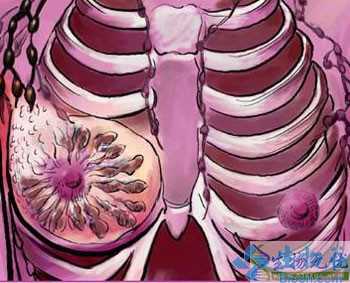PNAS:发现乳腺癌转移的新标记物
2013-05-06 生物无忧 生物无忧
由IRCM 的Jean-Francois Coté博士领导的团队在乳腺癌研究方面取得了一个重要的发现,这项研究的结果被发布在本周的PNAS上。研究者们确定了,一种名为DOCK1的蛋白质可以作为潜在的靶标用于减少乳腺癌患者的癌转移。 Coté's博士的实验室一直对癌转移的研究非常感兴趣,而乳腺癌是一种常常发生转移的癌症。将近90%的乳腺癌患者都因为癌症扩散而死,因此,理解这一危险过程的细胞和分
由IRCM 的Jean-Francois Coté博士领导的团队在乳腺癌研究方面取得了一个重要的发现,这项研究的结果被发布在本周的PNAS上。研究者们确定了,一种名为DOCK1的蛋白质可以作为潜在的靶标用于减少乳腺癌患者的癌转移。

Coté's博士的实验室一直对癌转移的研究非常感兴趣,而乳腺癌是一种常常发生转移的癌症。将近90%的乳腺癌患者都因为癌症扩散而死,因此,理解这一危险过程的细胞和分子基础机制是十分重要的。
IRCM细胞骨架组织和细胞迁移的研究中心的主任Coté博士说:“尽管在乳腺癌治疗方面已经取得了重要的进展,但是对于癌症扩散的机制我们却知之甚少。我们正在试图确定能够调节癌转移过程的蛋白质,因为它们或许可以作为新的药物靶标,并与现有的方法相结合促进治疗的效果。”
2个主要的癌症亚型——HER-2+型和Basal-like型,很容易转移和复发,并最终导致患者的低生存率。该调查以HER-2+(人类表皮生长因子受体2)型为研究对象, 这代表了大约25%的乳腺癌病例。 HER2阳性肿瘤比其它类型的肿瘤更倾向于快速的发展和扩散。
Coté's实验室的博士生Mélanie Laurin是这篇文章的第一作者,他解释到:“通过研究HER2+乳腺癌小鼠模型,我们确定了DOCK1蛋白质是癌转移的一个重要的调控因子。当我们去除了小鼠中的这一蛋白质后,乳腺癌的肺转移大大减少了。我们还发现,DOCK1蛋白质有助于肿瘤的生长。”
Coté小组的合作者、IRCM 的Benjamin Haibe-Kains博士补充说:“为了证明DOCK1的表达与乳腺癌预后之间的关系,我们对包含患者基因信息的几个数据库进行了分析。我们确实发现,在HER-2+型或Basal-like型乳腺癌中,高水平的DOCK1与较差的预后以及疾病的复发有关。”
“我们的工作确定了乳腺癌恶化到转移阶段所必需的一个新分子,这样我们就确定了可能停止癌转移发展的新标记物。这些结果将最终指导开发新的药物来限制乳腺癌转移的发展,进而改善患者的预后。”
加拿大癌症协会的科学交流顾问Melody Enguix说:“我们很荣幸能够资助这项研究。该发现为我们理解如何停止乳腺癌的转移提供了重要的基础。”(生物谷Bioon.com)

doi: 10.1073/pnas.1213050110
PMC:
PMID:
Rac-specific guanine nucleotide exchange factor DOCK1 is a critical regulator of HER2-mediated breast cancer metastasis
Mélanie Laurin, Jennifer Huber, Ariane Pelletier, Tarek Houalla, Morag Park, Yoshinori Fukui, Benjamin Haibe-Kains, William J. Muller, and Jean-Francois Coté.
Progression of solid tumors to the metastatic stage is accountable for the majority of cancer-related deaths. Further understanding of the molecular mechanisms governing metastasis is essential for the development of antimetastatic regimens. Here, we aimed to identify Rac activators that could promote metastasis downstream of human epithelial growth factor receptor 2 (HER2). We investigated if Dedicator of Cytokinesis 1 (DOCK1), based on its evolutionarily conserved role in receptor tyrosine kinases (RTKs)-mediated Rac activation and cell invasion, could be a regulator of metastasis. We report that high expression of DOCK1 in HER2+ and basal breast cancer subtypes inversely correlates with human patients’ survival. Mechanistically, DOCK1 interacts with HER2 and promotes HER2-induced Rac activation and cell migration. To gain further insight, we developed a HER2 breast cancer mouse model with mammary-gland–specific inactivation of DOCK1. In this in vivo model, a significant decrease in tumor growth and metastasis in lungs was found in animals where DOCK1 is inactivated. Furthermore, we found that DOCK1 is required for maximal activation of two HER2 effectors, c-JUN and STAT3. Using an unbiased gene profiling approach, we identified a mammary tumor DOCK1-associated gene signature enriched for genes implicated in response to IFN type I. This analysis revealed a unique set of genes, including Receptor Transporter Protein 4 (RTP4) and STAT1, for which the expression levels can be used to independently predict breast cancer outcome in HER2+ patients. Our work demonstrates DOCK1–Rac signaling as an HER2 effector pathway essential for HER2-mediated breast cancer progression to metastasis and offers a therapeutic opportunity to limit the spread of metastatic breast cancers.
(责任编辑:xiujuan.he)
分享到:本网站所有内容来源注明为“梅斯医学”或“MedSci原创”的文字、图片和音视频资料,版权均属于梅斯医学所有。非经授权,任何媒体、网站或个人不得转载,授权转载时须注明来源为“梅斯医学”。其它来源的文章系转载文章,或“梅斯号”自媒体发布的文章,仅系出于传递更多信息之目的,本站仅负责审核内容合规,其内容不代表本站立场,本站不负责内容的准确性和版权。如果存在侵权、或不希望被转载的媒体或个人可与我们联系,我们将立即进行删除处理。
在此留言









#标记物#
67
#PNAS#
71
#癌转移#
58